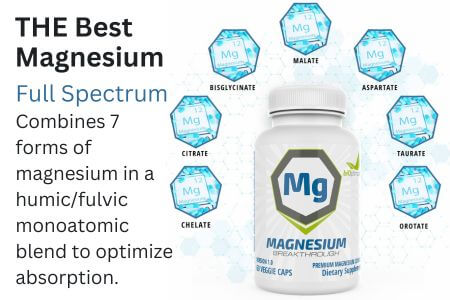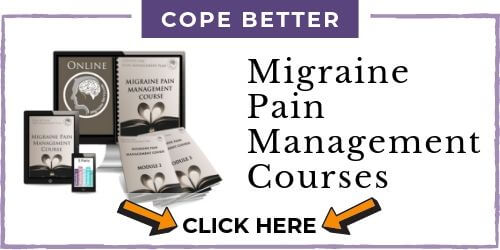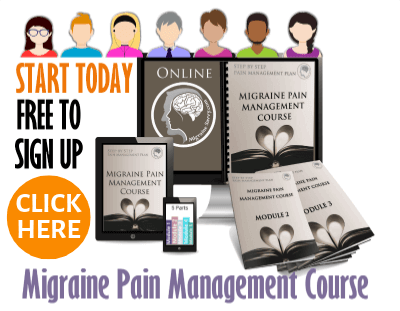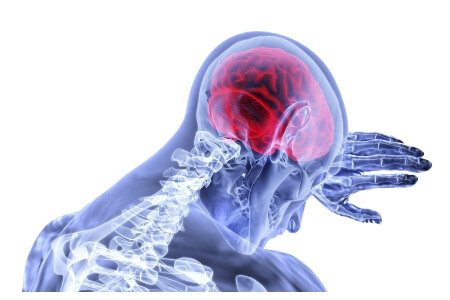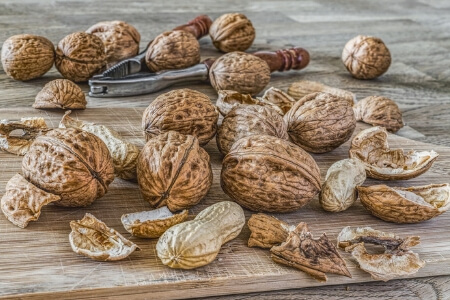GET THE BEST MAGNESIUM!
My #1. Magnesium Breakthrough by BiOptimizers – combines 7 types of magnesium in a humic/fulvic monoatomic blend to optimize absorption. This is by far the best product I have found so far in terms of results.
Migraine Headache Cures: Here Are Your Best Options
Currently there are no magic bullet migraine headache cures. There are, however, numerous medicines, treatments and alternative therapies that claim to help provide effective pain relief. Many have been clinically proven to assist in pain reduction.
And with today's technology there are new migraine treatment innovations all the time. We have the new CGRP medications and Ditans and Gepants. If you can afford any of those as an option.
To date, what I have found to be truly effective is:
- Naratriptan abortive medication in combination with an ibuprofen (400 mgs).
- Ice Packs on my neck and head with a hot water bottle on my hands.
- A lavender and rice eye bag, a guided mindfulness meditation for migraine CD, my nice silent dark room and warm comfy bed. And I did I mention silence, yes I did! Complete silence is heaven for me. And did I mention the dark room? Yes - these two and ice packs are migraine essentials for me.
If you have mild headaches, you can start with the more natural options, and lifestyle changes listed below. But if your headaches are moderate or severe, you may need to consider prescription medications and a treatment strategy.
Discuss your situation with your doctor, for any head pain, this is your first port of call.
My #1 Choice in Magnesium Supplements
Getting The Right Diagnosis And Finding Effective Treatment Is Your First Step
Once you have the right diagnosis of migraine, and the type, your next step is to find effective pain relief by working with a good doctor. A headache specialist is preferable.
And then you might want to use a holistic approach and add some lifestyle changes. It might be worth considering some of these treatments below in your pursuit of pain relief, even though technically there are no migraine headache cures yet. You could find more relief in any one of these ways:
- Diet – avoid triggers and remove allergens
- Anti-nausea bands
- Chiropractic manipulations or osteopathic treatments are NOT recommended
- Myofascial trigger point therapy
- Chinese Medicine - Chinese cure for migraine headache
- Herbs – feverfew and butterbur (do not use if pregnant)
- Lifestyle changes – stress reduction and relaxation techniques
- Physical Therapy
Surgical Treatments Should Be Your Last Step
Surgical treatments to reduce the frequency and severity of migraines are now available as a potential migraine headache cure. Surgery is normally used as a last resort, but I wanted to put it first because of all the new developments.
Surgeons are: implanting electrodes under the scalp and using a pacemaker like device to interrupt circuits; closing the Patent Foramen Ovale (PFO - a small hole located in the atrial septum that is used during fetal circulation to speed up the travel of blood through the heart); and doing microvascular decompression surgery (similar to carpal tunnel surgery, but it is performed on the neck).
According to the Cleveland clinic regarding migraine headaches and PFO, "Migraine headaches are more common in patients with PFO", this small hole in the heart. "While it seems as though closure of PFO results in improvement of migraine symptoms, larger studies are needed to confirm this finding.”
According to wiki answers, under “is there a migraine headache cure?” They mention a “NTI appliance” that can “adjust pressure and bad signaling of the nerves, as well as reducing muscle spasm (which for some is a trigger for migraines).” I only found it under dental appliances. It appears to be a mouth guard to stop you from clenching your teeth at night.
There is, however, little that alters the “spreading cortical depression of migraine”, meaning that a lot of these alternative treatments will just not work.
And remember, only some treatments work for some people, but all treatments do not work for all people.
Finding Migraine Headache Cures Can Be Trial And Error
Currently there are no guaranteed migraine headache cures, so finding effective pain relief is what you are looking for. It will be a lot of trial and error, in most cases.
Wiki also warns us that “the chiropractic treatment of neck manipulation carries a small risk of stroke due to causing clots in the carotid artery."
If you do decide to pursue chiropractic treatment for your migraine, "any good chiropractor will know other methods of adjusting the cervical spine without that classic neck twist."
I have not been able to find any clinical trials substantiating proof
that regular adjustments reduce migraine attacks at this time. Since there are currently no migraine headache cures, we could benefit from trying a combination of other treatments listed above that are more gentle and much more effective then chiropractic manipulations. They are NOT recommended for migraine treatment.
My #1 Choice in Magnesium Supplements
Medications You Can Take Now: Acute Abortive And Preventive
According to The Mayo Clinic there is no, one size fits all, magic migraine headache cure but "medications can help reduce the frequency and severity of migraines." They suggest talking to your doctor if treatments haven’t worked in the past as there are newer effective medicines now.
The right medicines, combined with self-help remedies and lifestyle changes, may make a tremendous difference.
~ The Mayo Clinic
There are two types of drugs – acute, also called abortive, and preventive also called prophylactic. The acute medications are taken only during or just before an attack. They are designed to stop the symptoms of the migraine before it begins to spread.
The preventive medications are taken regularly, on a daily basis. Many have side effects, but they are intended to reduce both the frequency and severity of your migraines.
Talking with your doctor is your first step, unless you like gathering more information over the internet. Be aware that you have information from a reputable site, and take that information with you to your doctor.
Even though there is no actual migraine headache cure, there
are a number of very effective drugs available now that abort them. The
triptan family is a ‘designer drug’ for migraines and has proven to be the most successful treatment so far.
If you also plan to take any over the counter painkillers, like I do with my Naramig, please make sure that they are specifically targeted for migraines to get the best results. Otherwise you might make things worse if you take a headache painkiller. Please read migraine vs headache for more details.
Be Sure To Take Migraine Specific Medications
Here is a list of some migraine specific medications that I am referring to:
• OTC Painkillers
Acetaminophen (Tylenol) and ibuprofen (Advil, Motrin, they have generic and other brand names) might help relieve your more mild migraine headaches.
These combinations are targeted with migraines in mind: Excedrin Migraine® is a combination of: acetaminophen, aspirin and caffeine. This combination may not be effective enough to handle a more severe migraine attack on its own. You might require an additional abortive to achieve effective relief. This combination should effectively ease moderate migraine pain.
There remains the problem of long term side effects of using these products, for example, if you take them for long periods of time, they can lead to ulcers, gastrointestinal bleeding and in some cases they can cause rebound headaches.
The Mayo clinic advises "the
prescription pain reliever indomethacin may help thwart a migraine
headache and is available in suppository form, which may be helpful if
you're nauseous."
• Triptans
My saviors – hail the almighty triptan!!!! We are so lucky to have finally found effective pain relief, with side effects that don’t knock our socks off. Ok, well some of these knocked my socks off – but if you haven’t tried these for migraine abortives, I can only encourage you to go to your doctor and talk with him or her about this possibility. Get your life back! Anyway, I digress – here they are:
Almotriptan (Axert), frovatriptan (Frova), eletriptan (Relpax), sumatriptan (Imitrex), rizatriptan (Maxalt), naratriptan (Amerge) and zolmitriptan (Zomig).
The most common side effects of triptan family of designer drugs include: nausea, increased heart rate, dizziness and muscle weakness. They are not recommended for people that are at known risk for strokes or heart attacks.
The Mayo Clinic tells us that...
A single-tablet combination of sumatriptan and naproxen sodium (Treximet) has proved more effective in relieving migraine symptoms than either medication on its own.
~ The Mayo Clinic
• Ergotamine
This one never agreed with me, and it is not considered as effective and has more severe side effects than the triptans. Ergotamine is targeted for those migraineurs whose attacks last more then 48 hours. It is often combined with caffeine (Migergot, Cafergot) to increase pain relief.
Dihydroergotamine (D.H.E. 45, Migranal) is available but it is hard to obtain now. It has been found to be more effective and has fewer side effects than ergotamine. The nasal spray and injection forms a better delivery method than oral tablets.
Remember those new medications. Always ask the doctor what's new in migraine prevention. Here's the link to the section on medications.
If you're interested, here's my trial-and-error list of migraine pain medication should you like to read it. The closest I have gotten to a migraine headache cure is using 2.5 mgs of Naramig with 400 mgs of Ibuprofen at my earliest warning sign. Taken together at the same time.
The Right Medications For Symptom Relief
There are a variety of medications you can can use for symptom relief, not a migraine headache cure, but they will help reduce the pain. There are anti-nausea medications, Opiates and Dexamethasone to use for migraine symptom relief.
To help us reduce nausea that accompanies our migraines the two most common medications are: metoclopramide (Reglan) and prochlorperazine (Compro). Opiates and habit forming narcotic medications, like codeine, are used as last resorts for people that cannot take ergotamine or triptans.
Another last resort is the corticosteroid Dexamethasone.
According to the mayo clinic “this corticosteroid may be used in
conjunction with other medication to improve pain relief. Because of the
risk of steroid toxicity, dexamethasone should not be used frequently” as a possible migraine headache cure.
More Options - Preventive Medications
If you have more than two debilitating migraine episodes a month, you might want to consider taking preventive medications.
Preventative medications for migraines are meant to reduce the severity, frequency and the length of migraine attacks. Your doctor may recommend that you take them regularly or cyclically with your menstrual cycle.
Preventive or prophylactic medications do not always eliminate the migraine headaches completely, so you may still have to take an abortive for an acute attack. I tried a number of these, but found the side effects to be too severe. Most doctors will suggest a 6 month trial to monitor effectiveness of migraine reduction.
The prophylactic medications most commonly prescribed are: cardiovascular drugs - beta blockers and calcium channel blockers; tricyclic antidepressants, anti-seizures drugs, anti-histamines, and more recently Botox.
A Small List of Preventative Medications You Can Try
Here is a list of some of those preventative medications:
- Beta blockers: propranolol (Inderal, Innopran XL, all medications have generic and other brand names in most cases)
- Calcium channel blockers: verapamil (Calan, Verelan)
- Anti-hypertensive medication: lisinopril (Zestril)
The most common side effects can include: dizziness, dry mouth, and drowsiness.
- Tricyclic antidepressants: amitriptyline (Vanatrip, Endep, Elavil), nortriptyline (Aventyl HCI, Pamelor) and protriptyline (Vivactil)
- Anti-seizure drugs: valproate (Depacon), topiramate (Topamax) and gabapentin (Neurontin), Lamotrigine (Lamictal)
Some common side effects include: nausea and vomiting, diarrhea, cramps, hair loss, and dizziness.
- Antihistamine: Cyproheptadine. Doctors use this one with children as it specifically affects serotonin activity. It has been proven effective through clinical trials to use with children as a preventive treatment for migraine.
- Botulinum toxin type A (Botox).
You can read a more extensive list here - Migraine Prevention Medications.
Ways I can help right now...
I would also like to mention that because
there is no cure available just yet, it's really important to take care of your
emotional health for long term resilience. Here are a few things I can help with:
Stay well and happy,
Holly
WANT MORE TIPS? Subscribe to my newsletter and follow along on Facebook and Pinterest for all of the latest updates.
CURE HEADACHES Related Articles
How to be more migraine savvy right now...
Elusive Migraine Headache Cures References:
1. Cleveland Clinic (2015) What is Patent Foramen Ovale? [Online], Available: https://my.clevelandclinic.org/health/diseases/17326-patent-foramen-ovale-pfo
2. Mayo Clinic (2015) Chronic Migraine Headache [Online], Available at: https://www.mayoclinic.org/diseases-conditions/chronic-daily-headaches/diagnosis-treatment/drc-20370897
3. Wiki Answers (2016) Is there a cure for Migraines? [Online], Available at: https://www.answers.com/Q/Is_there_a_cure_for_migraines
Updated Feb.11, 2024

